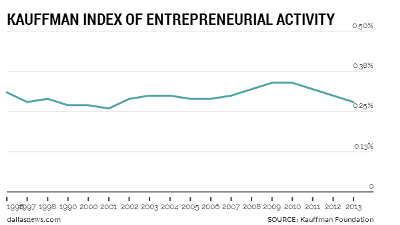The statistics about entrepreneurship in the US as brought together by the Kauffman foundation are clear: there is more people creating businesses when people have difficulties to find a job. Or, in summary, entrepreneurship is in majority a defensive move, contrary to what popular lore would tend to spread.

The data is clear: it is in a bad economy that the entrepreneurship ratio is higher, such as between 2009 and 2013 (see figure).
Similarly, immigrants have entrepreneurship ratios that can be twice as high as people born in the US, and people with high school education or less are also more frequently starting their own business, etc. In particular industries that go through tough times such as currently the Oil & Gas industry, the rate of business creation seems to increase significantly.
If a large amount of business creation is thus defensive, there is no surprise that many fail, due to the lack of preparation of the owner, or simply due to the fact that when times get better, business owners come back to more traditional employment.
Contrary to what most people think, the dynamism of entrepreneurship is not necessarily the sign of a dynamic economy; it could be the contrary. Some healthy level of entrepreneurship is necessary for economic development, but a higher ratio might not be good news.
All figures in this post from the Kauffman report.
